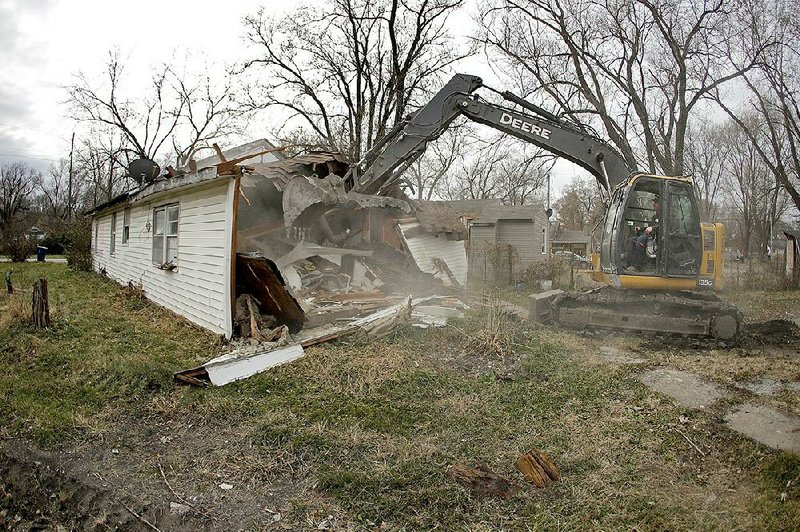MOSBY, Mo. -- Tammy Kilgore raised the giant claw of a John Deere excavator high in the air, then slammed it down on the roof of the house where she had spent nearly her entire adult life.
The shingles crunched, but not much else. So she did it again, and again -- each time taking a bigger bite with the mouth-like claw, until the roof above her bedroom caved. Lumber and siding fell to the ground.
The machine's operator had given Kilgore the chance to start demolishing her own home. It's one of dozens of flood-prone houses being torn down in this small riverside town northeast of Kansas City under a federally funded buyout program intended to reduce the risks and costs from future flooding.
The city of Mosby estimates it's faced 40 floods of varying severity over the past two decades, and Kilgore has lost count of the number of times her home got wet.
When the voluntary buyouts are complete, nearly half of Mosby will be gone, leaving a patchwork of holdout homes and bare lots.
Similar buyout programs have played out in numerous communities ravaged by floods and hurricanes. Over the past three decades, federal and local governments have spent more than $5 billion to buy tens of thousands of vulnerable properties across the U.S., according to an Associated Press analysis.
[Video not loading above? Click here to watch » https://www.youtube.com/watch?v=q9OjBaSEeJA]
While buyouts can be emotionally fraught for communities, they can lessen future flood-related costs by demolishing homes that could otherwise keep receiving federal disaster aid or taxpayer-subsidized flood insurance.
This year's flooding in the Midwest, which caused billions of dollars of damage in more than a dozen states, is likely to lead to more home buyouts.
For those facing buyouts, the process can be both a blessing and curse. It can provide a fresh start for flood-weary residents who choose to leave but also sever a sense of community for those left behind.
The 2010 census counted 190 people in Mosby. But that seems generous these days.
Mosby began as a railroad town in 1887 nestled along the Fishing River, a tributary of the Missouri River. It grew as coal mining took hold in the first half of the next century. At one point, it had a school, bank and grocery store, but all have since closed.
Financial strains led Mosby to disband its police department in 2015. That same year, the town was flooded three times in less than six weeks. Town officials decided in 2016 to apply to the state for a nearly $3 million buyout funded largely through the Federal Emergency Management Agency.
About 50 homeowners said they were interested. It took until this summer before they received buyout offers, and about two-thirds have taken the deal.
But for some, such as 83-year-old Elmer Sullivan, the offer just wasn't enough to afford a house somewhere else.
Sullivan was offered $20,000 for the modest home that he said he bought for $17,000 three decades ago. Since then, he put on a new roof and siding and spent $4,000 rebuilding a garage.
Mosby's revenue is likely to shrink as properties once on the tax rolls become empty plots owned by the city, Mayor Harlin Clements said. The terms of the buyouts prohibit future development.
[Gallery not loading above? Click here for photos » arkansasonline.com/1125buyouts/]
Though buyouts are disruptive, the U.S. saves $7 in avoided costs for every $1 spent through the federally funded grants to acquire or demolish flood-prone buildings, according to a study for the National Institute of Building Sciences.
"I can tell you -- mitigation works, it's very successful. It saves the pain and anguish of people that get flooded," former FEMA Administrator James Lee Witt said during a recent session hosted by The Pew Charitable Trusts on ways to reduce local flood risks.
Like most who take buyouts, the former residents of Mosby are now scattered. Some have moved to Excelsior Springs, a city of more than 11,000 immediately east. Others have gone west, toward the Kansas City suburbs. Still others moved into a rural area a few miles north.
When Tammy and James Kilgore moved out, they took some pine boards from their porch, a mailbox, a flagpole and plants from their yard. Scavengers quickly swooped in to swipe their furnace, air conditioner and dishwasher. Someone even ripped out the kitchen sink and all the pipes running to it.
By the time Tammy Kilgore climbed into the excavator to help tear down her old house, the ransacked interior looked nothing like the home she had left.
After taking a few swings with the machine, she passed the controls to a professional. The house was reduced to a pile of rubble in barely 10 minutes.
"Well, I can say this, there's a lot of love in them walls," Kilgore said, adding, "I'm not sad at all."
The Kilgores put their $45,000 buyout toward a brick house in Excelsior Springs -- a home on a hill.
"It's the best decision we ever made," she said.
A Section on 11/25/2019

